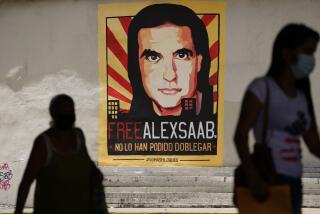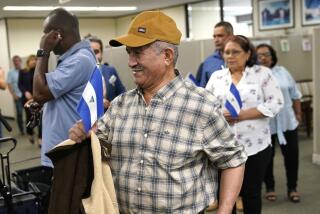Anti-Castro Terrorist Bosch Leaves Prison : Cuba: Some revere the exile as a patriot while others see him as a vestige of the past. His movements will be limited and contact with militants is banned.
MIAMI â The old anti-Castro terrorist is finally free, paroled Tuesday from a U.S. prison into the capital of the Cuban exile community, into a Miami where many consider him a revered patriot--and others deem him a pitiable fool.
Orlando Bosch, a 63-year-old man with a bad heart and ulcers, emerged through the gates with a look of determination, like one of those ghosts in the movies who has suddenly materialized after years in the void.
He has been jailed for most of the past two decades, here and in Venezuela. And he returns to a city very different from the one he fled in 1974.
Commando tactics have long since given way to sophisticated political lobbying. Most here think the Castro government is in massive decay--soon to crumble not from outside attack but from its own unsteady weight.
Orlando Bosch says he now believes this, too. A condition of his release is a disavowal of violence. âDr. Bosch reaffirms . . . that he has renounced terrorism in any form whatsoever as a means of political action. . . . â Hank Adorno, his attorney, said.
There are other conditions--something close to house arrest. He must wear an electronic ankle bracelet to monitor his whereabouts. He can go outdoors only from 11 a.m. to 2 p.m. He cannot speak with anti-Castro militants. His phone will be tapped. He must submit to lie detector tests.
âYou may reach the conclusion that Orlando Bosch is going to lead the life of a coward or a hermit . . . but, no!â he said at an evening press conference, vowing to spend his three hours a day of liberty out on the streets speaking out for his cause. â(The U.S. government) may have purchased a chain, but they donât have a monkey.â
Whatever the restrictions, he considers them better than confinement in the Metropolitan Correctional Center southwest of Miami, where he has been held for the past 26 months as a parole violator.
And better than deportation, which is what the U.S. government would prefer. Officials say they have asked 31 nations on six continents to accept the one-time pediatrician. No takers.
So he comes back to Miami, where he is seen variously as a hero, a relic or, by the Justice Departmentâs reckoning, a longtime terrorist.
Secret FBI and CIA files implicate him in numerous bombings, the department said last year as it denied the Cuban-born Bosch political asylum. Remember, officials cautioned, that this is a man once arrested for towing a torpedo through downtown during rush hour.
But where some see peril--others only find a purity of purpose. âBoschâs appeal is his principles, not his tactics,â says prominent Miami attorney Rafael Penalver. âThis is 1990, and the whole Cuban community condemns terrorism; itâs a non-issue.â
To understand the importance of Bosch is to recall 31 regretful years of exile. Some 577,000 people here are of Cuban birth or descent--and the great unhealed wound of their lives is communism in their homeland.
In the early 1960s, with Castro still new to power, many refugees became weekend commandos, attacking Cubaâs shores with CIA support. But the raids often turned into embarrassing failures, and the White House lost interest in its Cuban, anti-communist militia. Men such as Orlando Bosch became something akin to obsolete artillery.
He was not prepared to be idled. In 1968, he shot off a jerry-built bazooka at a Polish freighter in the Miami harbor. The attack did little to harm the vessel, but it did cost Bosch a 10-year term in federal prison. He was paroled after four years.
Like so many others, he then could have made his concessions to exile--earned a good living, bought a nice home, saved his strident exhortations for annual reunions.
But Bosch preferred a life of intrigue to a career in medicine.
In 1974, he fled rather than face a subpoena in a murder case. He wandered through Latin America, an eager conspirator in anti-communist plots. In 1976, he was charged in Venezuela with masterminding the bombing of a Cuban jetliner, in which 73 people died. Though he was acquitted three times, he was never freed--nor forgotten.
His prolonged jailing sparked protests and hunger strikes here. Then the prison doors suddenly opened. In 1988, Bosch boarded a plane to Miami, where his wife and children had remained.
There he stood at the airport--a long-gone parole violator with no visa, a hot potato for a White House that very much covets the political support of conservative and wealthy Cuban-Americans.
Delegation after delegation to Washington wanted to know: When will Bosch be freed? Attorneys pursued the matter. The federal judge assigned the case wondered aloud whether the government intended to hold Bosch indefinitely.
In February, soon after governments tumbled in Eastern Europe, nearly half of Cubans polled here said they thought Castro would be gone within the year. Talk of a free Cuba has become as strong a stimulant in Miami as good espresso. The urgent debate is how to hasten events: Would it be prudent to finally begin a dialogue with Castro--or is that idea still unspeakable?
Where exactly will Orlando Bosch fit in with all this avid, if possibly premature, planning? It is hard to say.
âThere are so many leaders with their own groups; itâs not likely anyone would say, OK Bosch, now you tell us what to do,â said Clark, the sociologist.
More to Read
Sign up for Essential California
The most important California stories and recommendations in your inbox every morning.
You may occasionally receive promotional content from the Los Angeles Times.










